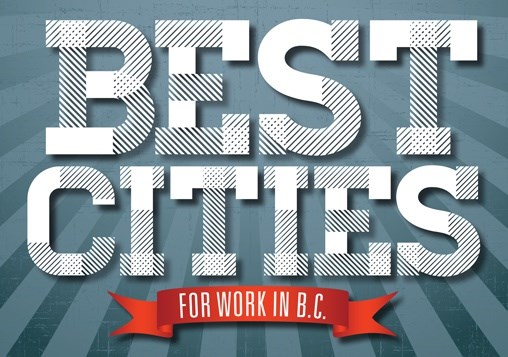Coquitlam and Port Coquitlam are on a magazine’s list of B.C.’s top 10 best cities in which to live and work.
This week, BCBusiness unveiled its second annual roll, showing Fort St. John defending its title. Coquitlam fell two spots from third to fifth place on the 2015 chart while PoCo rose from 13th to 10th.
Rounding out its best list are: Dawson Creek, North Vancouver district, Squamish, Langley district, Surrey, Delta and New Westminster. Vancouver ranked 17th while Victoria took 20th.
(Port Moody was not considered. “We excluded bedroom communities such as West Vancouver, Port Moody and White Rock, which had high incomes but relatively small job markets,” BCBusiness staff wrote in their online report.)
The survey, which was carried out with Environics Analytics, examined 36 B.C. cities based on six economic factors: five-year average household income change; average household income; average household income under 35; five-year population change; unemployment rate; and percentage of households whose members have university degrees.
David Munro, Coquitlam’s economic development manager, said the findings are “excellent news” for the municipality, which has been driving growth for a number of years (this month, city council approved a $500,000 fund specifically for new economic development projects).
“These are third-party statistics and for them to come up with Coquitlam being in the top five really reflects what we’ve been trying to achieve,” Munro said. “When you think about how well Coquitlam is located in the region, how we have a highly educated labour force and how diverse the make-up is of our business community, it makes sense.”
Munro said while Coquitlam has suffered some major blows recently with the loss of Target, Future Shop and Williams Moving and Storage, other businesses have moved in quickly to fill the gaps.
He pointed to the Sony warehouse off United Boulevard, which closed early this year. By the fall, the North Bend Street facility — at 121,884 sq. ft over 8.69 acres — had sold to GFR Pharma Ltd., a leading Canadian producer of supplements and natural health products. That business means 110 jobs in the new year — all of which will be high-paying, Munro said.
Meanwhile, Target in Coquitlam Centre mall will be replaced with Walmart this spring while Future Shop’s space at the mall has been filled by its sister company, Best Buy (its former site on Pinetree Way is now empty).
Munro said many business headquarters are coming into town, especially in the financial sector, attracted to — among other things — QNet (the city’s high-speed fibre optic network), the Evergreen Line (due to open in early 2017) and the $4 billion in infrastructure investment by the provincial government (Port Mann Bridge and King Edward Street overpass, for example).
“Private investment always follows public,” Munro said.
As for Port Coquitlam, which has cheaper residential, commercial and industrial land than in neighbouring Coquitlam, Mayor Greg Moore said the city has also worked hard to make local business prosper.
And he said local government has shown “respect” for its own workers by looking at bringing in a living wage that would pay municipal employees and its major contractors at least $19.75 an hour.
Overall, Moore said, the Tri-Cities is a desirable place to live. “People are moving here all the time because of the natural elements and amenities we have.”
BCBusiness will publish its findings in its January 2016 edition.
[email protected]
@jwarrenTC



